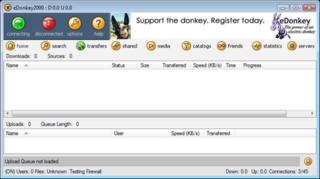
Shareaza is a peer-to-peer file sharing client running under Microsoft Windows which supports the Gnutella, Gnutella2 (G2), eDonkey, BitTorrent, FTP, HTTP and HTTPS network protocols and handles magnet links, ed2k links, and the now deprecated gnutella and Piolet links. It is available in 30 languages.

eDonkey2000 was a peer-to-peer file sharing application developed by US company MetaMachine, using the Multisource File Transfer Protocol. It supported both the eDonkey2000 network and the Overnet network.
BitTorrent is a communication protocol for peer-to-peer file sharing (P2P), which enables users to distribute data and electronic files over the Internet in a decentralized manner. The protocol is developed and maintained by Rainberry, Inc., and was first released in 2001.
MLDonkey is an open-source, multi-protocol, peer-to-peer file sharing application that runs as a back-end server application on many platforms. It can be controlled through a user interface provided by one of many separate front-ends, including a Web interface, telnet interface and over a dozen native client programs.

gtk-gnutella is a peer-to-peer file sharing application which runs on the gnutella network. gtk-gnutella uses the GTK+ toolkit for its graphical user interface. Released under the GNU General Public License, gtk-gnutella is free software.

BitComet is a cross-protocol BitTorrent, HTTP and FTP client written in C++ for Microsoft Windows and available in 52 different languages. Its first public release was version 0.28. The current BitComet logo has been used since version 0.50.
The eDonkey Network is a decentralized, mostly server-based, peer-to-peer file sharing network created in 2000 by US developers Jed McCaleb and Sam Yagan that is best suited to share big files among users, and to provide long term availability of files. Like most sharing networks, it is decentralized, as there is no central hub for the network; also, files are not stored on a central server but are exchanged directly between users based on the peer-to-peer principle.
The Kad network is a peer-to-peer (P2P) network which implements the Kademlia P2P overlay protocol. The majority of users on the Kad Network are also connected to servers on the eDonkey network, and Kad Network clients typically query known nodes on the eDonkey network in order to find an initial node on the Kad network.
A BitTorrent tracker is a special type of server that assists in the communication between peers using the BitTorrent protocol.

KTorrent is a BitTorrent client that is part of the KDE Gear.

FrostWire is a free and open-source BitTorrent client first released in September 2004, as a fork of LimeWire. It was initially very similar to LimeWire in appearance and functionality, but over time developers added more features, including support for the BitTorrent protocol. In version 5, support for the Gnutella network was dropped entirely, and FrostWire became a BitTorrent-only client.
Peer exchange or PEX is a communications protocol that augments the BitTorrent file sharing protocol. It allows a group of users that are collaborating to share a given file to do so more swiftly and efficiently.

eMule is a free peer-to-peer file sharing application for Microsoft Windows. Started in May 2002 as an alternative to eDonkey2000, eMule now connects to both the eDonkey network and the Kad network. The distinguishing features of eMule are the direct exchange of sources between client nodes, fast recovery of corrupted downloads, and the use of a credit system to reward frequent uploaders. Furthermore, eMule transmits data in zlib-compressed form to save bandwidth.
Rainberry, Inc., formerly known as BitTorrent, Inc., is an American company responsible for μTorrent and BitTorrent Mainline. The company was founded on September 22, 2004 by Bram Cohen and Ashwin Navin. It was successful during the Great Recession under the leadership of CEO Eric Klinker. In 2018, the company was acquired by cryptocurrency startup TRON, and Bram Cohen left the company. In March 2022, the SEC charged Rainberry with fraud for selling cryptocurrencies Tronix (TRX) and BitTorrent (BTT) as unregistered securities.
Suprnova.org was a Slovenia-based website that distributed BitTorrent trackers for various music and video files, computer programs and games. Started in late 2002 by Andrej Preston and for a while considered the most popular BitTorrent search engine, Suprnova.org closed in late 2004 after legal threats. The site operators supported the development of the eXeem BitTorrent client software, deeming a fixed website too difficult to operate in the present legal climate. On 2 August 2007, the domain name was donated to The Pirate Bay, which relaunched the site on 21 August 2007.
The following is a general comparison of BitTorrent clients, which are computer programs designed for peer-to-peer file sharing using the BitTorrent protocol.
This is a glossary of jargon related to peer-to-peer file sharing via the BitTorrent protocol.

libtorrent is an open-source implementation of the BitTorrent protocol. It is written in and has its main library interface in C++. Its most notable features are support for Mainline DHT, IPv6, HTTP seeds and μTorrent's peer exchange. libtorrent uses Boost, specifically Boost.Asio to gain its platform independence. It is known to build on Windows and most Unix-like operating systems.
In the BitTorrent file distribution system, a torrent file or meta-info file is a computer file that contains metadata about files and folders to be distributed, and usually also a list of the network locations of trackers, which are computers that help participants in the system find each other and form efficient distribution groups called swarms. Torrent files are normally named with the extension .torrent.

μTorrent, or uTorrent, is a proprietary adware BitTorrent client owned and developed by Rainberry, Inc. The "μ" in its name comes from the SI prefix "micro-", referring to the program's small memory footprint: the program was designed to use minimal computer resources while offering functionality comparable to larger BitTorrent clients such as Vuze or BitComet. μTorrent became controversial in 2015 when many users unknowingly accepted a default option during installation which also installed a cryptocurrency miner.








